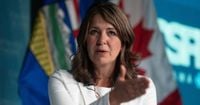Alberta Premier Danielle Smith has stirred significant political discourse by announcing plans for a potential referendum on provincial separation in 2026, contingent upon citizen support through petition signatures. During a livestreamed address on May 5, 2025, Smith articulated her vision for a sovereign Alberta within a united Canada, while acknowledging the rising dissatisfaction among Albertans with the current federal government, which she described as 'hostile' to the province's interests.
Smith stated, "They are quite literally our friends and neighbors who just had enough of having their livelihoods and prosperity attacked by a hostile federal government. They’re frustrated, and they have every reason to be." This statement reflects her understanding of the sentiments driving the separatist movement, which has gained momentum following the recent federal election where the Liberal Party secured its fourth consecutive term.
The premier's announcement comes on the heels of her government introducing legislation aimed at easing the requirements for initiating a referendum. If passed, the new rules would lower the threshold for petition signatures needed to trigger a referendum from 20% of total registered voters to just 10% of eligible voters from the last general election. Additionally, petitioners would be granted 120 days instead of 90 to gather the required 177,000 signatures.
Smith emphasized that her government does not intend to put a separation question on the ballot unless there is a successful citizen-led petition. "To be clear from the outset, our government will not be putting a vote on separation from Canada on the referendum ballot," she clarified. However, she assured that if citizens successfully gather the necessary signatures, the question would be included in the 2026 provincial referendum.
The premier's remarks were made during a time of heightened frustration among Albertans, particularly following the federal election results, which many view as a continuation of policies detrimental to the province's economy. Smith criticized the federal government's management of Alberta's resources, stating, "We have the most abundant and accessible natural resources of any country on Earth, and yet we landlock them, sell what we do produce to a single customer to the south of us while enabling polluting dictatorships to eat our lunch."
In response to these challenges, Smith announced the formation of a negotiation team that will advocate for Alberta's interests at the federal level, seeking to secure access to tidewater for energy exports and to push for changes to equalization payments. She expressed the need for a new agreement with Ottawa, suggesting it could be dubbed an "Alberta accord," which would ensure fair treatment for the province.
Smith's leadership has also prompted discussions about the economic implications of her government's approach. Critics, including Alberta NDP leader Naheed Nenshi, have accused her of fostering a divisive atmosphere that could alienate investors. Nenshi stated, "Danielle Smith coddles people who want to tear our nation apart. She doesn't tell them that they're wrong, she doesn't argue with them, she doesn't say she disagrees with them."
In her address, Smith acknowledged the legitimacy of grievances surrounding federal policies but reiterated her commitment to upholding the constitutional rights of Indigenous peoples. She emphasized that any referendum question must respect treaties 6, 7, and 8, stating, "This is non-negotiable."
The premier's address coincided with a rally at the Alberta legislature, where hundreds gathered to express their support for secession from Canada. Many attendees cited the recent election results as a catalyst for their frustrations, feeling that their concerns have been consistently overlooked by the federal government.
Smith also plans to chair the "Alberta Next" panel, which will host town hall meetings to gather feedback from Albertans on how the province can better protect itself from perceived federal incursions. Some of the ideas discussed at these meetings may also be considered for inclusion in the 2026 referendum.
Despite the growing separatist sentiment, Smith has expressed a desire to maintain Alberta's place within Canada. She believes that while many Albertans feel disillusioned, there is still hope for a constructive relationship with the federal government. "I believe Alberta has a future in Canada, but I understand the feelings of those who’ve lost hope," she said.
Political analysts have noted that threats of separation can be a strategic tool for provincial leaders seeking concessions from the federal government. Duane Bratt, a political science professor at Calgary’s Mount Royal University, remarked, "The premier knows that separation threats are an effective strategy to get concessions, and is likely very happy discontented folks are pushing for it."
As Premier Smith prepares for a news conference on May 6, 2025, to further discuss her plans, the political landscape in Alberta remains charged with uncertainty. The outcome of her proposed referendum and negotiations with the federal government will likely shape the province's future in the coming years.
In summary, Premier Danielle Smith's announcement regarding a potential separation referendum has ignited a complex dialogue about Alberta's relationship with Canada, reflecting deep-seated frustrations among many Albertans. As the political climate evolves, the implications of these discussions will undoubtedly resonate across the nation.


